Mobile:+86-311-808-126-83
Email:info@ydcastings.com
English
impeller in a pump
The Role of the Impeller in a Pump Understanding Its Importance and Functionality
Pumps are essential devices that facilitate the movement of fluids from one location to another, playing a vital role in various industries, including water supply, chemical processing, and oil extraction. One of the critical components of a pump is the impeller. This article will delve into the functions, types, and significance of the impeller in the operation of a pump.
What is an Impeller?
An impeller is a rotating component found within a pump that transfers energy to the fluid. It usually consists of a set of blades or vanes mounted on a central hub, and its primary function is to increase the velocity of the fluid flowing through the pump. By converting mechanical energy from a motor into hydrodynamic energy, the impeller enables the movement of fluids, making it an integral part of the pump's design.
How Does an Impeller Work?
The operation of an impeller can be understood through the principles of fluid dynamics. As the impeller spins, its blades push the fluid outward, utilizing centrifugal force to create a high-pressure zone at the impeller's outer diameter. This action generates a flow of fluid toward the pump's discharge port. Depending on the design of the impeller and the pump, this process can significantly enhance the pressure and flow rate of the fluid being transported.
Types of Impellers
There are various types of impellers, each designed for specific applications and fluid characteristics. The most common types include
1. Open Impellers These impellers have blades that are not enclosed by a casing. They are simple in design and ideal for handling liquids with solid particles, such as slurry, due to their ability to pass larger particles without clogging.
impeller in a pump

2. Closed Impellers Featuring two sidewalls that encapsulate the blades, closed impellers are more efficient than open ones. They create higher pressure and are commonly used in applications requiring a high flow rate and pressure, such as in water supply systems.
3. Semi-Open Impellers A compromise between open and closed designs, semi-open impellers offer moderate efficiency and can handle some particulate matter. They are often used in applications with moderately dirty fluids.
4. Vortex Impellers These impellers create a vortex flow pattern, allowing them to handle fluids with larger solids or contaminated liquids. They are typically used in wastewater treatment facilities.
Significance of Impellers in Pump Operations
The design and material of the impeller significantly affect the pump’s overall efficiency, performance, and lifespan. High-quality impellers, made from materials resistant to corrosion and cavitation, can enhance the reliability of pump operations. Cavitation is a phenomenon that occurs when the pressure of the fluid drops below its vapor pressure, leading to the formation and collapse of vapor bubbles, which can severely damage the impeller.
Furthermore, the impeller’s size and shape determine the pump’s flow rate and pressure capabilities. Engineers meticulously select and design impellers to match the specific requirements of the pump in which they will be used, thereby optimizing performance for various applications.
Conclusion
In conclusion, the impeller is a fundamental component of pump systems that directly influences fluid movement and energy transfer. Understanding the types, functions, and significance of impellers enables engineers and technicians to make informed choices in pump design and application. As industries continue to evolve and require more efficient fluid management solutions, the role of the impeller will remain critical in advancing pump technology and improving operational efficiency. The ongoing innovation in impeller designs will undoubtedly contribute to enhanced performance in diverse applications, ensuring that pumps remain a cornerstone of fluid transportation and management across various sectors.
-
Materials Used in Manufacturing Cap End Pipe FittingsNewsNov.24,2025
-
Material Properties of CF8M CastingNewsNov.24,2025
-
How to Inspect Pump Cap Ends for DamageNewsNov.21,2025
-
Backward Curved Impeller – Efficient Airflow Solutions for Industry | YD CastingsNewsNov.21,2025
-
Automobile Water Pump - Efficient, Quiet, Durable & ElectricNewsNov.21,2025
-
Impeller for Pumps – High-Efficiency, Durable, OEM-ReadyNewsNov.21,2025











